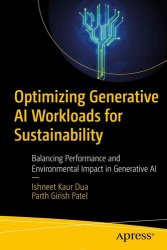Optimizing Generative AI Workloads for Sustainability: Balancing Performance and Environmental Impact in Generative AI
- Добавил: literator
- Дата: 19-11-2024, 14:36
- Комментариев: 0
 Название: Optimizing Generative AI Workloads for Sustainability: Balancing Performance and Environmental Impact in Generative AI
Название: Optimizing Generative AI Workloads for Sustainability: Balancing Performance and Environmental Impact in Generative AIАвтор: Ishneet Kaur Dua, Parth Girish Patel
Издательство: Apress
Год: 2024
Страниц: 328
Язык: английский
Формат: pdf
Размер: 13.3 MB
This comprehensive guide provides practical strategies for optimizing Generative AI systems to be more sustainable and responsible. As advances in Generative AI such as large language models accelerate, optimizing these resource-intensive workloads for efficiency and alignment with human values grows increasingly urgent.
The book starts with the concept of Generative AI and its wide-ranging applications, while also delving into the environmental impact of AI workloads and the growing importance of adopting sustainable AI practices. It then delves into the fundamentals of efficient AI workload management, providing insights into understanding AI workload characteristics, measuring performance, and identifying bottlenecks and inefficiencies. Hardware optimization strategies are explored in detail, covering the selection of energy-efficient hardware, leveraging specialized AI accelerators, and optimizing hardware utilization and scheduling for sustainable operations. You are also guided through software optimization techniques tailored for Generative AI, including efficient model architecture, compression, and quantization methods, and optimization of software libraries and frameworks. Data management and preprocessing strategies are also addressed, emphasizing efficient data storage, cleaning, preprocessing, and augmentation techniques to enhance sustainability throughout the data life cycle. The book further explores model training and inference optimization, cloud and edge computing strategies for Generative AI, energy-efficient deployment and scaling techniques, and sustainable AI life cycle management practices, and concludes with real-world case studies and best practices
By the end of this book, you will take away a toolkit of impactful steps you can implement to minimize the environmental harms and ethical risks of Generative AI. For organizations deploying any type of generative model at scale, this essential guide provides a blueprint for developing responsible AI systems that benefit society.
Generative artificial intelligence, also known as generative AI and GenAI, refers to a category of AI systems that use machine learning models to create new, original content rather than simply analyze existing datasets. Unlike most AI, which focuses on pattern recognition in data to optimize decision-making or predictions, generative AI can synthesize completely new data that has never been seen before by the system. At a basic level, generative AI systems work by learning the underlying patterns and structures within a certain domain of data—whether it be text, images, audio, video, or something else. By analyzing thousands or millions of examples, the AI develops an implicit understanding of what plausible new outputs in that domain could be. It learns features and rules inherent within the data that allow it to emulate and build off what it has seen, going beyond those finite examples.
What You Will Learn:
Understand how Generative AI can be more energy-efficient through improvements such as model compression, efficient architecture, hardware optimization, and carbon footprint tracking
Know the techniques to minimize data usage, including evaluation, filtering, synthesis, few-shot learning, and monitoring data demands over time
Understand spanning efficiency, data minimization, and alignment for comprehensive responsibility
Know the methods for detecting, understanding, and mitigating algorithmic biases, ensuring diversity in data collection, and monitoring model fairness
Who This book Is For:
Professionals seeking to adopt responsible and sustainable practices in their Generative AI work; leaders and practitioners who need actionable strategies and recommendations that can be implemented directly in real-world systems and organizational workflows; ML engineers and data scientists building and deploying Generative AI systems in industry settings; and researchers developing new generative AI techniques, such as at technology companies or universities.
Скачать Optimizing Generative AI Workloads for Sustainability: Balancing Performance and Environmental Impact in Generative AI
Внимание
Уважаемый посетитель, Вы зашли на сайт как незарегистрированный пользователь.
Мы рекомендуем Вам зарегистрироваться либо войти на сайт под своим именем.
Уважаемый посетитель, Вы зашли на сайт как незарегистрированный пользователь.
Мы рекомендуем Вам зарегистрироваться либо войти на сайт под своим именем.
Информация
Посетители, находящиеся в группе Гости, не могут оставлять комментарии к данной публикации.
Посетители, находящиеся в группе Гости, не могут оставлять комментарии к данной публикации.
